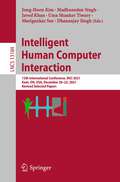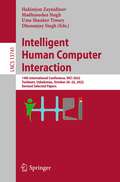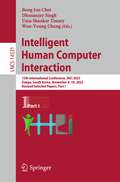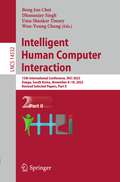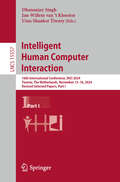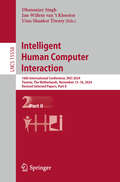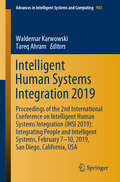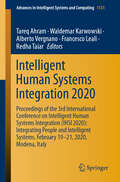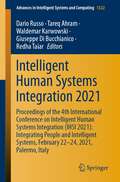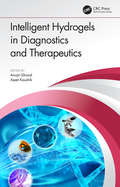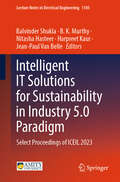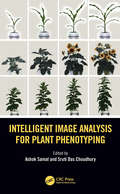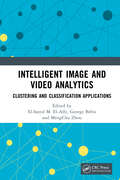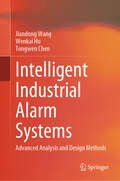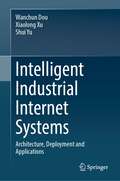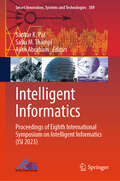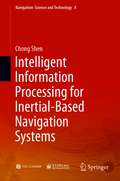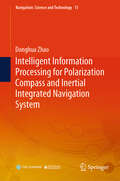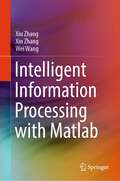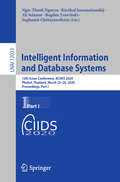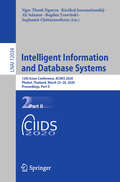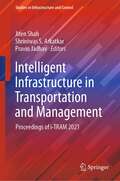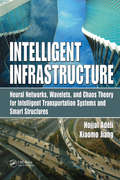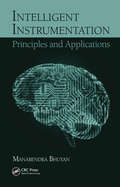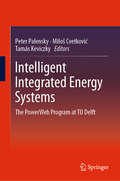- Table View
- List View
Intelligent Human Computer Interaction: 13th International Conference, IHCI 2021, Kent, OH, USA, December 20–22, 2021, Revised Selected Papers (Lecture Notes in Computer Science #13184)
by Madhusudan Singh Uma Shanker Tiwary Dhananjay Singh Jong-Hoon Kim Javed Khan Marigankar SurThis volume constitutes the refereed proceedings of the 13th International Conference on Intelligent Human Computer Interaction, IHCI 2021, which took place in Kent, OH, USA, in December 2021. The 59 full and 9 short papers included in these proceedings were carefully reviewed and selected from a total of 142 submissions. The papers were organized in topical sections named human centered AI; and intelligent interaction and cognitive computing
Intelligent Human Computer Interaction: 14th International Conference, IHCI 2022, Tashkent, Uzbekistan, October 20–22, 2022, Revised Selected Papers (Lecture Notes in Computer Science #13741)
by Madhusudan Singh Uma Shanker Tiwary Dhananjay Singh Hakimjon ZaynidinovThis book constitutes the refereed proceedings of the 14th International Conference on Intelligent Human Computer Interaction, IHCI 2022, held in Tashkent, Uzbekistan, during October 20–22, 2022. The 47 full papers and 13 short papers included in this book were carefully reviewed and selected from 148 submissions. They were organized in topical sections as follows: Bio-inspired Computing; Cognitive computing; Human Centered AI; Intelligent Technology for Post-Covid and Web Frameworks.
Intelligent Human Computer Interaction: 15th International Conference, IHCI 2023, Daegu, South Korea, November 8–10, 2023, Revised Selected Papers, Part I (Lecture Notes in Computer Science #14531)
by Uma Shanker Tiwary Dhananjay Singh Wan-Young Chung Bong Jun ChoiThis book constitutes the refereed proceedings of the 15th International Conference on Intelligent Human Computer Interaction, IHCI 2023, held in Daegu, South Korea, during November 8–10, 2023.The 55 full papers and 16 short papers included in this book were carefully reviewed and selected from 139 submissions. They were organized in topical sections as follows: Volume I: Natural Language and Dialouge Systems, Affective Computing and Human Factors, Human Centred AI, Human-Robot Interaction and Intelligent Interfaces and User Centred Design.Volume II: AI and Big Data, Deep Learning, Intelligent Systems, Mobile Computing and Ubiquitous Interactions and Social Computing and Interactive Elements.
Intelligent Human Computer Interaction: 15th International Conference, IHCI 2023, Daegu, South Korea, November 8–10, 2023, Revised Selected Papers, Part II (Lecture Notes in Computer Science #14532)
by Uma Shanker Tiwary Dhananjay Singh Wan-Young Chung Bong Jun ChoiThis book constitutes the refereed proceedings of the 15th International Conference on Intelligent Human Computer Interaction, IHCI 2023, held in Daegu, South Korea, during November 8–10, 2023.The 55 full papers and 16 short papers included in this book were carefully reviewed and selected from 139 submissions. They were organized in topical sections as follows: Volume I: Natural Language and Dialouge Systems, Affective Computing and Human Factors, Human Centred AI, Human-Robot Interaction and Intelligent Interfaces and User Centred Design.Volume II: AI and Big Data, Deep Learning, Intelligent Systems, Mobile Computing and Ubiquitous Interactions and Social Computing and Interactive Elements.
Intelligent Human Computer Interaction: 16th International Conference, IHCI 2024, Twente, The Netherlands, November 13–16, 2024, Revised Selected Papers, Part I (Lecture Notes in Computer Science #15557)
by Uma Shanker Tiwary Dhananjay Singh Jan-Willem van ’t KloosterThis volume LNCS 15557 constitutes the refereed proceedings of 16th International Conference on Intelligent Human Computer Interaction, IHCI 2024, held in Twente, The Netherlands, during November 13-16, 2024. The 37 full papers and 2 short papers were carefully reviewed and selected from 107 submissions. They were categorized under the topical sections as follows: Learning in healthcare and wellbeing Robots and conversation agents Physical world and Posters Human factors Algorithims and computer vision Human factors in cybersecurity
Intelligent Human Computer Interaction: 16th International Conference, IHCI 2024, Twente, The Netherlands, November 13–16, 2024, Revised Selected Papers, Part II (Lecture Notes in Computer Science #15558)
by Uma Shanker Tiwary Dhananjay Singh Jan-Willem van ’t KloosterThis volume LNCS 15557 constitutes the refereed proceedings of 16th International Conference on Intelligent Human Computer Interaction, IHCI 2024, held in Twente, The Netherlands, during November 13-16, 2024. The 37 full papers and 2 short papers were carefully reviewed and selected from 107 submissions. They were categorized under the topical sections as follows: HCI across domains Augmented & virtual reality Usability & UX Healthcare & clinical AI Centric HCI
Intelligent Human Systems Integration 2019: Proceedings of the 2nd International Conference on Intelligent Human Systems Integration (IHSI 2019): Integrating People and Intelligent Systems, February 7-10, 2019, San Diego, California, USA (Advances in Intelligent Systems and Computing #903)
by Waldemar Karwowski Tareq AhramThis book presents cutting-edge research on innovative human systems integration and human–machine interaction, with an emphasis on artificial intelligence and automation, as well as computational modeling and simulation. It covers a wide range of applications in the area of design, construction and operation of products, systems and services, including lifecycle development and human–technology interaction. The book describes advanced methodologies and tools for evaluating and improving interface usability, new models, and case studies and best practices in virtual, augmented and mixed reality systems, with a special focus on dynamic environments. It also discusses various factors concerning the human user, hardware, and artificial intelligence software.Based on the proceedings of the 2nd International Conference on Intelligent Human Systems Integration (IHSI 2019), held on February 7–10, 2019, in San Diego, California, USA, the book also examines the forces that are currently shaping the nature of computing and cognitive systems, such as the need to reduce hardware costs; the importance of infusing intelligence and automation; the trend toward hardware miniaturization and power reduction; the need for a better assimilation of computation in the environment; and social concerns regarding access to computers and systems for people with special needs. It offers a timely survey and a practice-oriented reference guide for policy- and decision-makers, human factors engineers, systems developers and users alike.
Intelligent Human Systems Integration 2020: Proceedings of the 3rd International Conference on Intelligent Human Systems Integration (IHSI 2020): Integrating People and Intelligent Systems, February 19-21, 2020, Modena, Italy (Advances in Intelligent Systems and Computing #1131)
by Waldemar Karwowski Tareq Ahram Redha Taiar Francesco Leali Alberto VergnanoThis book presents cutting-edge research on innovative human systems integration and human–machine interaction, with an emphasis on artificial intelligence and automation, as well as computational modeling and simulation. It covers a wide range of applications in the areas of design, construction and operation of products, systems and services, and discusses the human factors in a wide range of settings. Gathering the proceedings of the 3rd International Conference on Intelligent Human Systems Integration (IHSI 2020), held on February 19–21, 2020, in Modena, Italy, the book’s goal is to advance the theory and applications of artificial cognitive systems and improve human-artificial systems collaboration. Special emphasis is placed on automotive design, autonomous vehicles and the applications of artificial intelligence. The book offers a timely survey and source of inspiration for human factors engineers, automotive engineers, IT developers and UX designers who are working to shape the future of automated intelligent systems.
Intelligent Human Systems Integration 2021: Proceedings of the 4th International Conference on Intelligent Human Systems Integration (IHSI 2021): Integrating People and Intelligent Systems, February 22-24, 2021, Palermo, Italy (Advances in Intelligent Systems and Computing #1322)
by Waldemar Karwowski Tareq Ahram Giuseppe Di Bucchianico Redha Taiar Dario RussoThis book presents cutting-edge research on innovative human systems integration and human–machine interaction, with an emphasis on artificial intelligence and automation, as well as computational modeling and simulation. It covers a wide range of applications in the area of design, construction and operation of products, systems and services. The book describes advanced methodologies and tools for evaluating and improving interface usability, new models, and case studies and best practices in virtual, augmented and mixed reality systems, with a special focus on dynamic environments. It also discusses various factors concerning the human user, hardware, and artificial intelligence software. Based on the proceedings of the 4th International Conference on Intelligent Human Systems Integration (IHSI 2021), held on February 22–24, 2021, the book also examines the forces that are currently shaping the nature of computing and cognitive systems, such as the need to reduce hardware costs; the importance of infusing intelligence and automation; the trend toward hardware miniaturization and optimization; the need for a better assimilation of computation in the environment; and social concerns regarding access to computers and systems for people with special needs. It offers a timely survey and a practice-oriented reference guide for policy- and decision-makers, human factors engineers, systems developers and users alike.
Intelligent Hydrogels in Diagnostics and Therapeutics
by Ajeet Kaushik Anujit GhosalThis book explores the potential of hydrogels as a multiutility system and their benefits (biocompatibility, degradability, and supporting scaffolds) for a wide range of applications in diagnostics and therapeutics. It also discusses the future prospects and challenges facing hydrogels. A wide variety of smart hydrogels (conducting, stimuli responsive, and others) with possible biomedical applications are elaborated. The book demonstrates the effectiveness of hydrogels in diagnostics of diseases in various in vivo and in vitro environments and highlights the engineering/functionalization of hydrogels for everyday drug dosage as an efficient drug carrier, scaffold, and sensing application. Explores the potential of hydrogels as a multifunctional system and their benefits, particularly for biomedical applications in diagnostics as well as therapeutics. Highlights the designing and engineering of hydrogels for everyday drug dosage and possible functionalization to fabricate an efficient drug carrier. Examines the significance of biopolymer-based hydrogels and their responsiveness in different physiological fluids. Demonstrates the effectiveness of hydrogels in diagnostics of diseases in various in,vivo and in,vitro environments. Presents challenges associated with the hydrogels and discusses possible in-hand modifications at length. Dr. Anujit Ghosal worked in the School of Biotechnology, Jawaharlal Nehru University, India. Currently, he is affiliated with the School of Life Sciences, Beijing Institute of Technology, Beijing, PRC. Dr. Ghosal researches in biochemistry, polymer chemistry, and nanotechnology. He has been the recipient of prestigious fellowships throughout his research career. His research ability is proven by his published peer-reviewed research and review articles and contributed book chapters. Dr. Ajeet Kaushik works as an assistant professor of chemistry and is exploring advanced electrochemical sensing systems and nanomedicine for personalized health wellness at the Department of Natural Sciences of the Division of Science, Arts, and Mathematics at Florida Polytechnic University, Lakeland, US. He is the recipient of various reputed awards for his service in the area of nanobiotechnology for health care. His excellent research credentials are reflected by his four edited books, 100 international research peer-reviewed publications, and three patents in the area of nanomedicine and smart biosensors for personalized health care.
Intelligent IT Solutions for Sustainability in Industry 5.0 Paradigm: Select Proceedings of ICEIL 2023 (Lecture Notes in Electrical Engineering #1185)
by Harpreet Kaur Balvinder Shukla B. K. Murthy Nitasha Hasteer Jean-Paul Van BelleThis volume comprises the select proceedings of the 5th International Conference on Entrepreneurship, Innovation, and Leadership (ICEIL 2023). The content focuses on intelligent IT Solutions for sustainability in the Industry 5.0 paradigm with themes highlighting smart grids, intelligent power systems, digital health and automation, IoT and applications in healthcare, agricultural automation, precision agriculture, BI innovation, AI for value creation, security awareness and education, biometric technologies and applications, human-centric solutions, ICT development in higher education, gamification in the classroom, etc. This volume will be of immense interest to those in academia and industry.
Intelligent Image Analysis for Plant Phenotyping
by Ashok Samal and Sruti Das ChoudhuryDomesticated crops are the result of artificial selection for particular phenotypes or, in some cases, natural selection for an adaptive trait. Plant traits can be identified through image-based plant phenotyping, a process that was, until recently, strenous and time-consuming. Intelligent Image Analysis for Plant Phenotyping reviews information on time-saving techniques, using computer vision and imaging technologies. These methodologies provide an automated, non-invasive, and scalable mechanism by which to define and collect plant phenotypes. Beautifully illustrated, with numerous color images, the book focuses on phenotypes measured from individual plants under controlled experimental conditions, which are widely available in high-throughput systems. Features: Presents methodologies for image processing, including data-driven and machine learning techniques for plant phenotyping. Features information on advanced techniques for extracting phenotypes through images and image sequences captured in a variety of modalities. Includes real-world scientific problems, including predicting yield by modeling interactions between plant data and environmental information. Discusses the challenge of translating images into biologically informative quantitative phenotypes. A practical resource for students, researchers, and practitioners, this book is invaluable for those working in the emerging fields at the intersection of computer vision and plant sciences.
Intelligent Image and Video Analytics
by George Bebis MengChu Zhou El-Alfy, El-Sayed M.Video has rich information including meta-data, visual, audio, spatial and temporal data which can be analysed to extract a variety of low and high-level features to build predictive computational models using machine-learning algorithms to discover interesting patterns, concepts, relations, and associations. This book includes a review of essential topics and discussion of emerging methods and potential applications of video data mining and analytics. It integrates areas like intelligent systems, data mining and knowledge discovery, big data analytics, machine learning, neural network, and deep learning with focus on multimodality video analytics and recent advances in research/applications. Features: Provides up-to-date coverage of the state-of-the-art techniques in intelligent video analytics. Explores important applications that require techniques from both artificial intelligence and computer vision. Describes multimodality video analytics for different applications. Examines issues related to multimodality data fusion and highlights research challenges. Integrates various techniques from video processing, data mining and machine learning which has many emerging indoors and outdoors applications of smart cameras in smart environments, smart homes, and smart cities. This book aims at researchers, professionals and graduate students in image processing, video analytics, computer science and engineering, signal processing, machine learning, and electrical engineering.
Intelligent Industrial Alarm Systems: Advanced Analysis and Design Methods
by Tongwen Chen Jiandong Wang Wenkai HuThis book fills a gap in existing literature by providing a comprehensive academic perspective on industrial alarm systems, offering systematic methodologies, practical techniques, and visual analytic tools for engineers to improve system performance and design. Modern industrial plants rely on computerized monitoring systems to track hundreds of process variables in real time, enabling operators to maintain safe and efficient conditions. Automatic industrial alarm systems play a crucial role in alerting operators to abnormalities, such as high vessel levels, that could lead to unsafe conditions if left unaddressed. While contemporary alarm systems can be plagued with issues like nuisance alarms, recent academic research has introduced advanced methodologies, like Markov chain theory and Bayesian estimation, to optimize alarm parameters and enhance system performance. By integrating these theoretical advancements into practical applications, the goal is to develop intelligent industrial alarm systems that leverage historical data and process knowledge to predict and prevent alarm floods, ultimately ensuring safer and more efficient plant operations.
Intelligent Industrial Internet Systems: Architecture, Deployment and Applications
by Shui Yu Xiaolong Xu Wanchun DouIn the process of transforming modern manufacturing into intelligent manufacturing, more and more manufacturing processes are being deployed digitally on the Internet. As a novel digital industrial infrastructure and new application ecology, Industrial Internet could integrate the novel information and communication technology into various industrial manufacturing processes, through the safe and reliable intelligent interconnection of factors concerning people, machines and things. It aims at significantly improving the digitalization, networking and intelligence of manufacturing processes through the comprehensive interconnection of all manufacturing factors. To deploy and run traditional manufacturing processes on Industrial Internet efficiently, corresponding digital technical means are called for. These technical means play an important role in many potential applications of intelligent manufacturing, e.g. integrating product lifecycle data, strengthening industrial chain cooperation, providing decision-making service information oriented on the production organization process, and providing data support for product optimization and upgrading.This book focuses on the theory, techniques and means for integrating intelligent Industrial Internet applications deployed via mobile edge computing. Concretely, it mainly studies the intelligent theory, techniques and means from a problem-driven and demand-driven perspective, which supports collaborative design, agile manufacturing, remote operation and maintenance on Industrial Internet. These technologies primarily include Industrial Internet-centric intelligent resource scheduling methods, various types of industrial data privacy protection, intelligent version management technologies supporting digital twin applications, various data mining algorithms for intelligent execution of business processes, etc. Given its scope, the book offers a valuable theoretical and technical resource for project managers, technical developers, researchers, educators and students at colleges and universities.
Intelligent Informatics: Proceedings of Eighth International Symposium on Intelligent Informatics (ISI 2023) (Smart Innovation, Systems and Technologies #389)
by Ajith Abraham Sankar K. Pal Sabu M. ThampiThis book constitutes thoroughly refereed post-conference proceedings of the 8th International Symposium on Intelligent Informatics (ISI 2023), December 18–20, 2023, Bangalore, India. The revised papers presented were carefully reviewed and selected from several initial submissions. The scope of the symposium includes AI, machine learning, cognitive computing, soft computing, security informatics, data science, computer vision, pattern recognition, intelligent software engineering, intelligent networked systems, IoT, cyber-physical systems, and NLP. The book is directed to the researchers and scientists engaged in various fields of computing and network communication domains.
Intelligent Information Processing for Inertial-Based Navigation Systems (Navigation: Science and Technology #8)
by Chong ShenThis book introduces typical inertial devices and inertial-based integrated navigation systems, gyro noise suppression, gyro temperature drift error modeling compensation, inertial-based integrated navigation systems under discontinuous observation conditions, and inertial-based brain integrated navigation systems. Integrated navigation is the result of the development of modern navigation theory and technology. The inertial navigation system has the advantages of strong autonomy, high short-term accuracy, all-day time, all weather, and so on. And it has been applied in most integrated navigation systems. Among them, the information processing of inertial-based integrated navigation system is the core technology. Due to the effect of the device mechanism and working environment, there are errors in the output information of the inertial-based integrated navigation system, including gyroscope noise, temperature drift, and discontinuous observations, which will seriously reduce the accuracy and robustness of the system. And the book helps readers to solve these problems. The intelligent information processing technology involved is equipped with simulation verification, which can be used as a reference for undergraduate, graduate, and Ph.D. students, and also scientific researchers or engineers engaged in navigation-related specialties.
Intelligent Information Processing for Polarization Compass and Inertial Integrated Navigation System (Navigation: Science and Technology #15)
by Donghua ZhaoThis book systematically elaborates on the intelligent information processing technology for a bioinspired polarization compass and inertial integrated navigation system. It consists of three parts. Firstly, the research background and significance of intelligent information processing technology for a bioinspired polarization compass are introduced. It analyzes the research status, development trends, and comparisons with foreign countries in the field of orientation methods based on atmospheric polarization patterns. The processing methods of the orientation error for a bioinspired polarization compass and integrated system information processing are also covered. Subsequently, the noise components of a bioinspired polarization compass and the impact of noise on its directional accuracy are discussed. It also introduces the denoising and orientation error compensation technique based on intelligent algorithms such as multi-scale principal component analysis and multi-scale adaptive time-frequency peak filtering. The third part focuses on the application of cubature Kalman filter and their improvement methods in seamless combination orientation systems based on a bioinspired polarization compass. A seamless combination orientation model under discontinuous observation conditions is proposed and a discontinuous observation algorithm based on neural networks is designed.
Intelligent Information Processing with Matlab
by Xin Zhang Wei Wang Xiu ZhangThis book is a comprehensive collection of technologies and methods on intelligent information processing, which includes artificial neural network, fuzzy logic, and evolutionary computing. It also introduces the latest research directions and progress in intelligent information processing, such as transfer learning through convolutional neural network, time series prediction, clustering based on fuzzy neural network, test and evaluation of the traveling salesman problem, test and evaluation of continuous optimization problem, and more. This book promotes the development and application of intelligent information processing technology in the field of computational intelligence, effectively improving the intersection and integration of intelligent information processing methods. Researchers in computational intelligence and artificial intelligence technology, as well as teachers, students, and others interested in the subject, will benefit from this book.
Intelligent Information and Database Systems: 12th Asian Conference, ACIIDS 2020, Phuket, Thailand, March 23–26, 2020, Proceedings, Part I (Lecture Notes in Computer Science #12033)
by Ngoc Thanh Nguyen Ali Selamat Bogdan Trawiński Suphamit Chittayasothorn Kietikul JearanaitanakijThe two-volume set LNAI 12033 and 11034 constitutes the refereed proceedings of the 12th Asian Conference on Intelligent Information and Database Systems, ACIIDS 2020, held in Phuket, Thailand, in March 2020. The total of 105 full papers accepted for publication in these proceedings were carefully reviewed and selected from 285 submissions. The papers of the first volume are organized in the following topical sections: Knowledge Engineering and Semantic Web, Natural Language Processing, Decision Support and Control Systems, Computer Vision Techniques, Machine Learning and Data Mining, Deep Learning Models, Advanced Data Mining Techniques and Applications, Multiple Model Approach to Machine Learning. The papers of the second volume are divided into these topical sections: Application of Intelligent Methods to Constrained Problems, Automated Reasoning with Applications in Intelligent Systems, Current Trends in Arti cial Intelligence, Optimization, Learning,and Decision-Making in Bioinformatics and Bioengineering, Computer Vision and Intelligent Systems, Data Modelling and Processing for Industry 4.0, Intelligent Applications of Internet of Things and Data AnalysisTechnologies, Intelligent and Contextual Systems, Intelligent Systems and Algorithms in Information Sciences, Intelligent Supply Chains and e-Commerce, Privacy, Security and Trust in Arti cial Intelligence, Interactive Analysis of Image, Video and Motion Data in LifeSciences.
Intelligent Information and Database Systems: 12th Asian Conference, ACIIDS 2020, Phuket, Thailand, March 23–26, 2020, Proceedings, Part II (Lecture Notes in Computer Science #12034)
by Ngoc Thanh Nguyen Ali Selamat Bogdan Trawiński Suphamit Chittayasothorn Kietikul JearanaitanakijThe two-volume set LNAI 12033 and 11034 constitutes the refereed proceedings of the 12th Asian Conference on Intelligent Information and Database Systems, ACIIDS 2020, held in Phuket, Thailand, in March 2020. The total of 105 full papers accepted for publication in these proceedings were carefully reviewed and selected from 285 submissions. The papers of the first volume are organized in the following topical sections: Knowledge Engineering and Semantic Web, Natural Language Processing, Decision Support and Control Systems, Computer Vision Techniques, Machine Learning and Data Mining, Deep Learning Models, Advanced Data Mining Techniques and Applications, Multiple Model Approach to Machine Learning. The papers of the second volume are divided into these topical sections: Application of Intelligent Methods to Constrained Problems, Automated Reasoning with Applications in Intelligent Systems, Current Trends in Arti cial Intelligence, Optimization, Learning,and Decision-Making in Bioinformatics and Bioengineering, Computer Vision and Intelligent Systems, Data Modelling and Processing for Industry 4.0, Intelligent Applications of Internet of Things and Data AnalysisTechnologies, Intelligent and Contextual Systems, Intelligent Systems and Algorithms in Information Sciences, Intelligent Supply Chains and e-Commerce, Privacy, Security and Trust in Arti cial Intelligence, Interactive Analysis of Image, Video and Motion Data in LifeSciences.
Intelligent Infrastructure in Transportation and Management: Proceedings of i-TRAM 2021 (Studies in Infrastructure and Control)
by Jiten Shah Shriniwas S. Arkatkar Pravin JadhavThis book mainly focuses on the innovations in intelligent transportation infrastructure and management. The content of the book is selected in such a way that it will cover a wide range of areas to integrate advanced technologies and provide best and innovative solution to problems faced by the rapidly growing transportation sector. The topics of the book primarily address the needs of the students in civil, electrical, and mechanical engineering. It is equally useful as reference material for innovators, inventors, practitioners, and policymaker for an innovative and classified solution in the field of transportation and infrastructure management. Looking at the global electric and hybrid vehicles market, the book focuses on and discuss recent developments in electric mobility across the globe. In this edition, we try to feature toward an update on the performance and costs of batteries which is the current demand of the consumers. The book inspires researchers, innovators, industry experts, and policymakers to consider the solutions into the practice.
Intelligent Infrastructure: Neural Networks, Wavelets, and Chaos Theory for Intelligent Transportation Systems and Smart Structures
by Hojjat Adeli Xiaomo JiangRecent estimates hypothesize that the US will need $1.6 trillion dollars for the rehabilitation, replacement, and maintenance of existing infrastructure systems within the next 20 years. Presenting a new vision and way of designing and managing the civil infrastructure of the nation, Intelligent Infrastructure: Neural Networks, Wavelets, and Chaos
Intelligent Instrumentation: Principles and Applications
by Manabendra BhuyanWith the advent of microprocessors and digital-processing technologies as catalyst, classical sensors capable of simple signal conditioning operations have evolved rapidly to take on higher and more specialized functions including validation, compensation, and classification. This new category of sensor expands the scope of incorporating intelligen
Intelligent Integrated Energy Systems: The Powerweb Program At TU Delft
by Peter Palensky Miloš Cvetković Tamás Keviczky<p>This book presents research results of PowerWeb, TU Delft’s consortium for interdisciplinary research on intelligent, integrated energy systems and their role in markets and institutions. In operation since 2012, it acts as a host and information platform for a growing number of projects, ranging from single PhD student projects up to large integrated and international research programs. The group acts in an inter-faculty fashion and brings together experts from electrical engineering, computer science, mathematics, mechanical engineering, technology and policy management, control engineering, civil engineering, architecture, aerospace engineering, and industrial design. <p>The interdisciplinary projects of PowerWeb are typically associated with either of three problem domains: Grid Technology, Intelligence and Society. PowerWeb is not limited to electricity: it bridges heat, gas, and other types of energy with markets, industrial processes, transport, and the built environment, serving as a singular entry point for industry to the University’s knowledge. Via its Industry Advisory Board, a steady link to business owners, manufacturers, and energy system operators is provided.</p>
